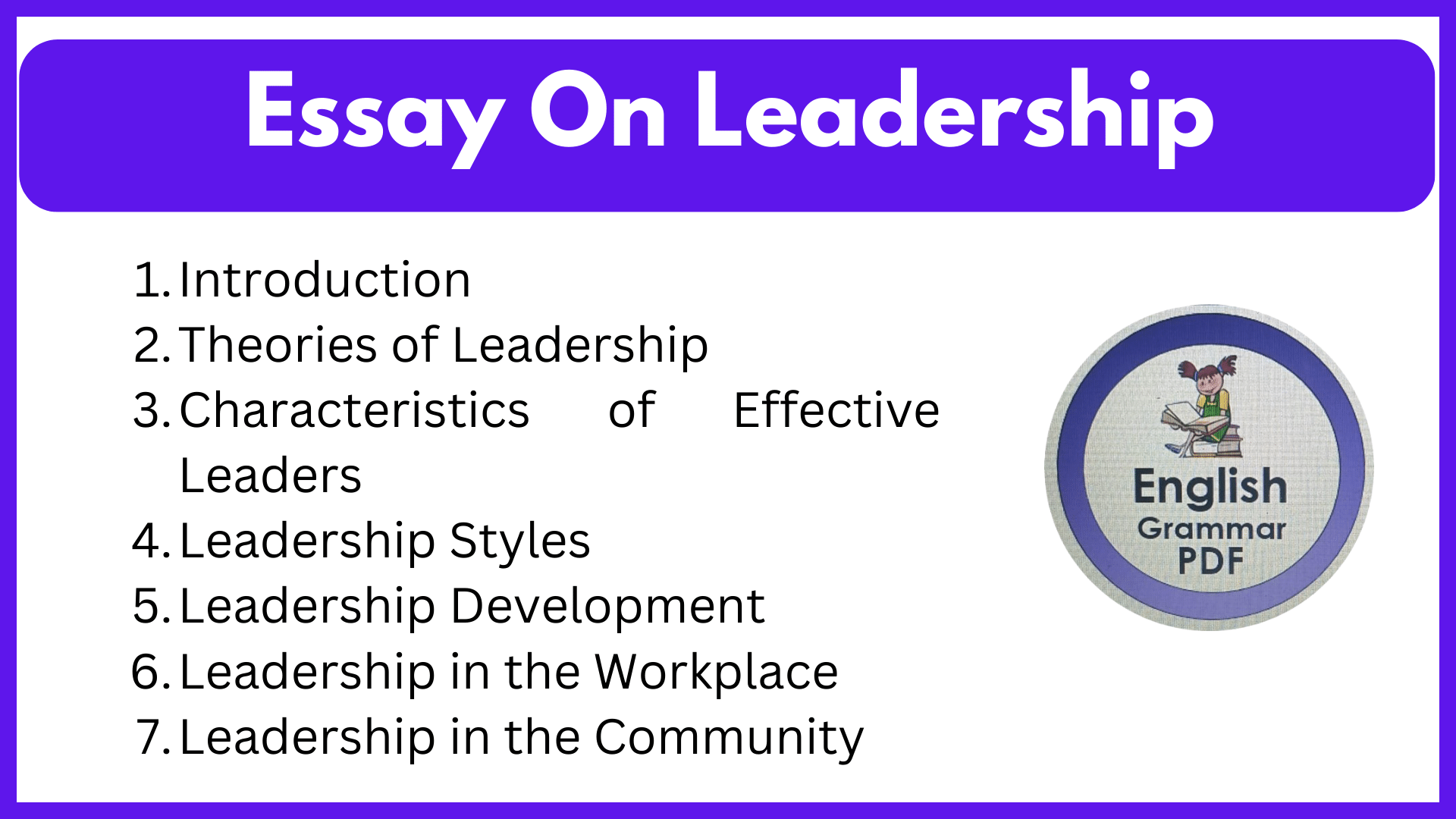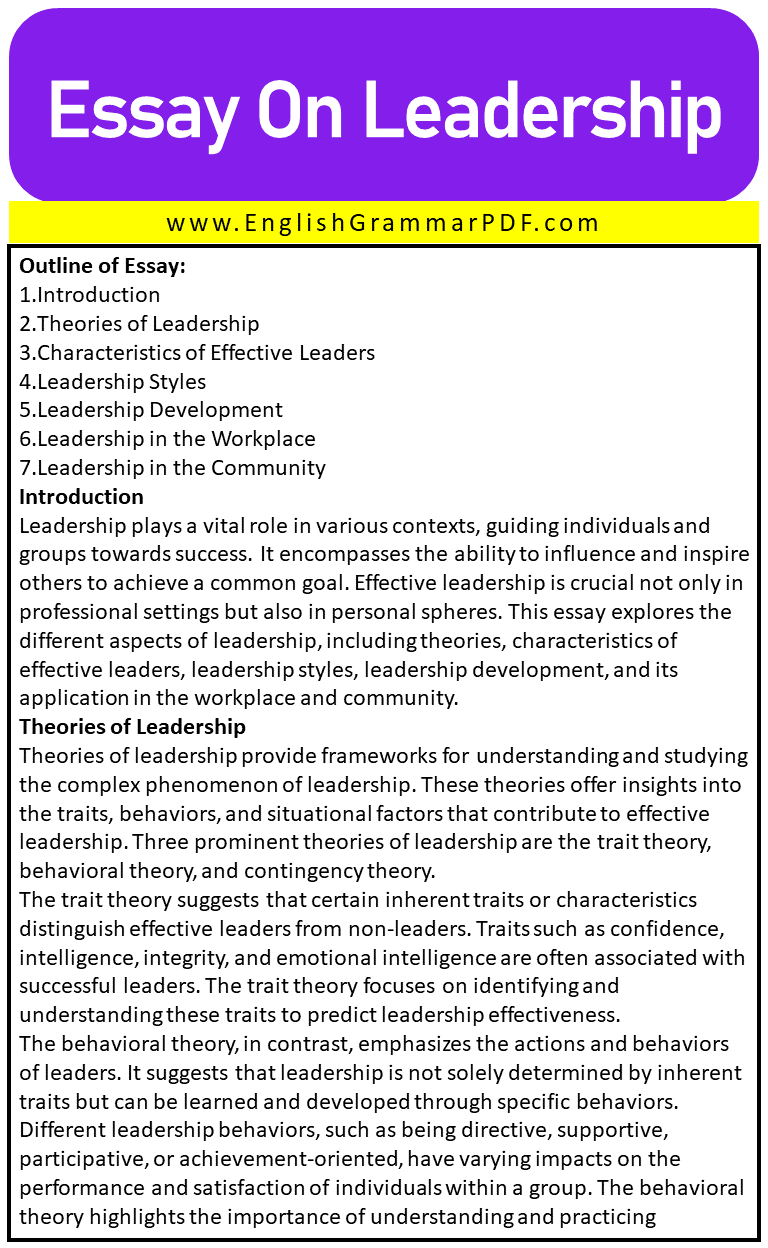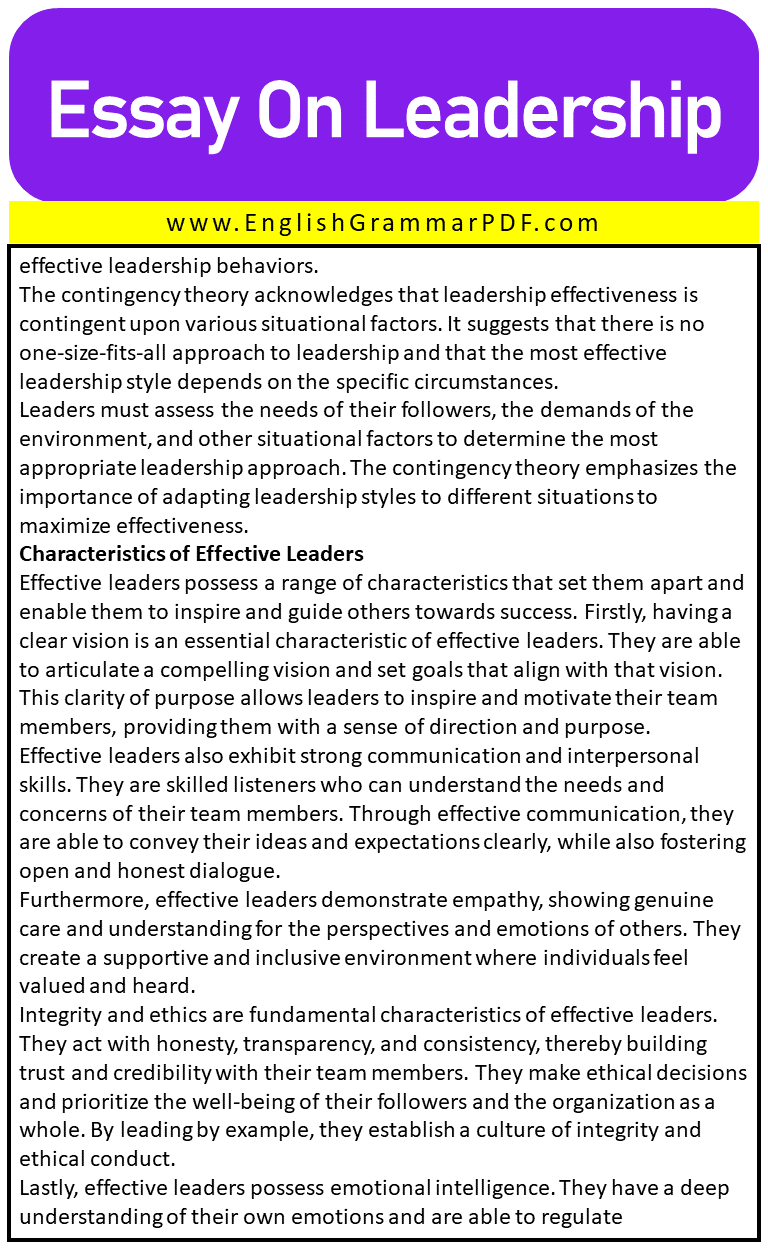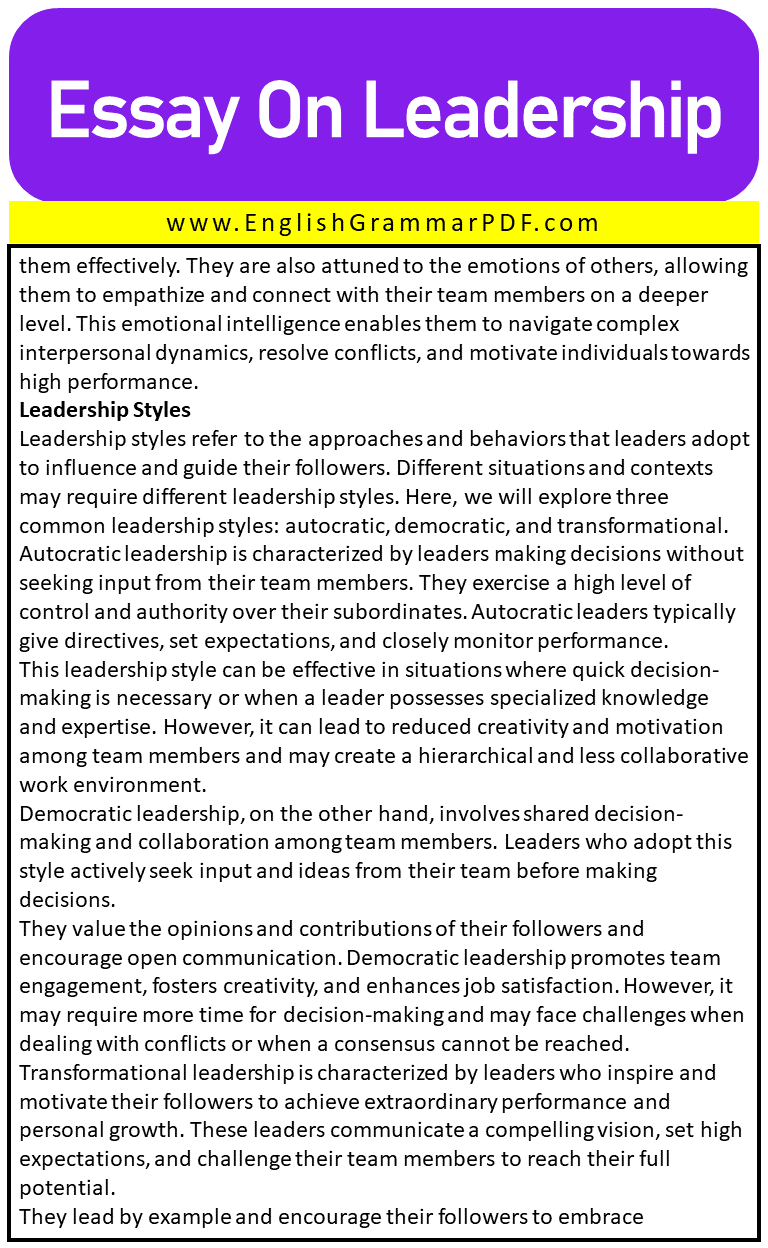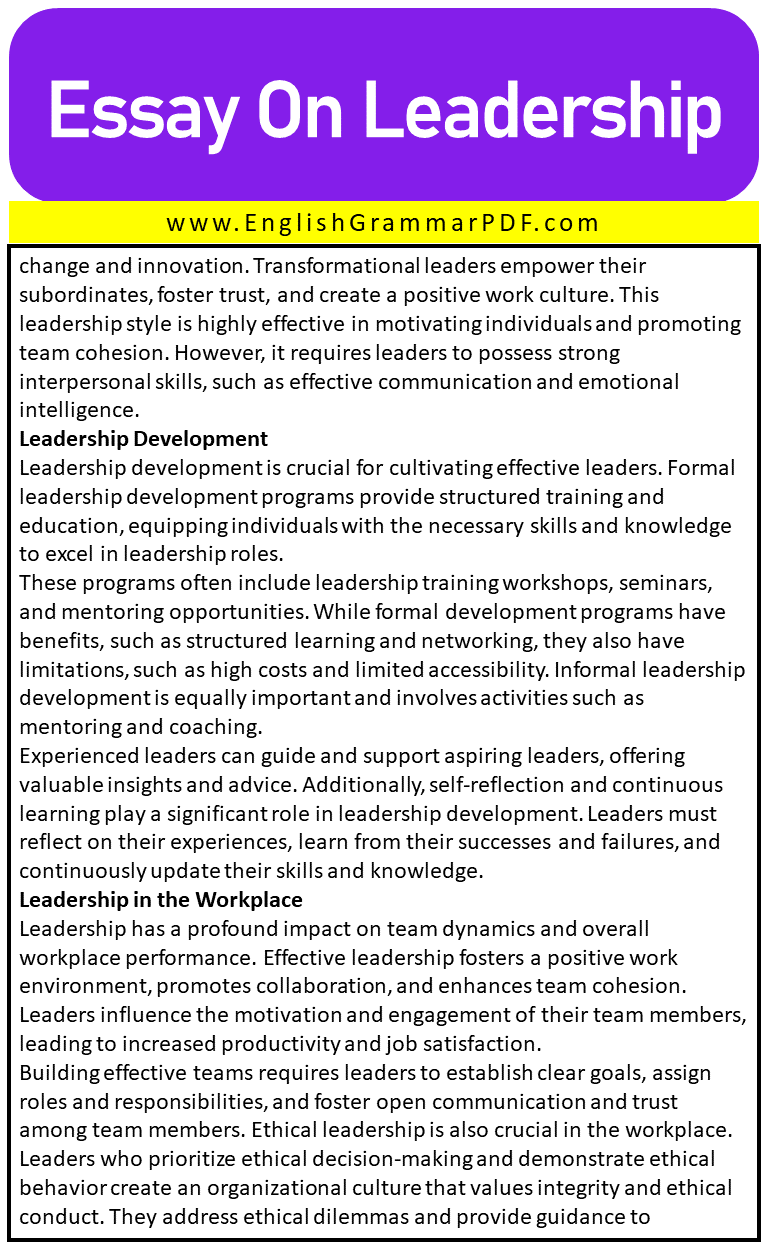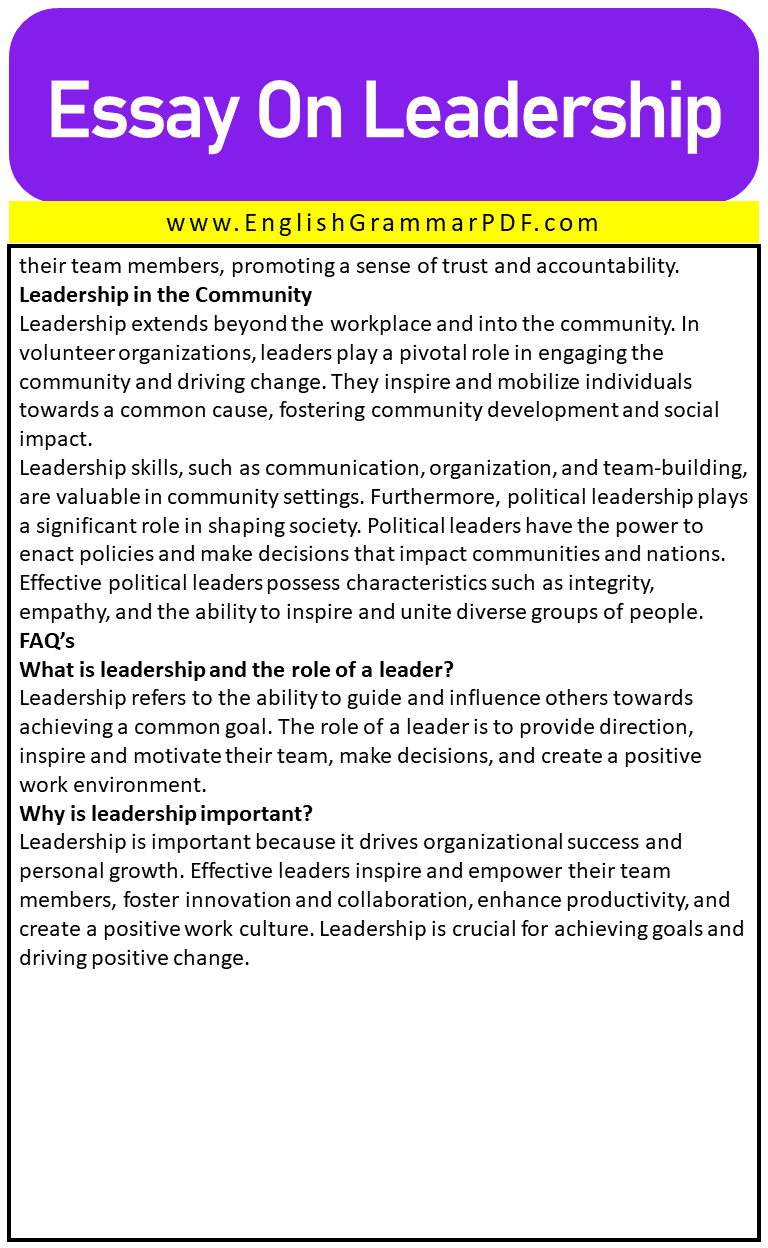Essay On Leadership
Outline of Essay:
- Introduction
- Theories of Leadership
- Characteristics of Effective Leaders
- Leadership Styles
- Leadership Development
- Leadership in the Workplace
- Leadership in the Community
Introduction
Leadership plays a vital role in various contexts, guiding individuals and groups towards success. It encompasses the ability to influence and inspire others to achieve a common goal. Effective leadership is crucial not only in professional settings but also in personal spheres. This essay explores the different aspects of leadership, including theories, characteristics of effective leaders, leadership styles, leadership development, and its application in the workplace and community.
Theories of Leadership
Theories of leadership provide frameworks for understanding and studying the complex phenomenon of leadership. These theories offer insights into the traits, behaviors, and situational factors that contribute to effective leadership. Three prominent theories of leadership are the trait theory, behavioral theory, and contingency theory.
The trait theory suggests that certain inherent traits or characteristics distinguish effective leaders from non-leaders. Traits such as confidence, intelligence, integrity, and emotional intelligence are often associated with successful leaders. The trait theory focuses on identifying and understanding these traits to predict leadership effectiveness.
The behavioral theory, in contrast, emphasizes the actions and behaviors of leaders. It suggests that leadership is not solely determined by inherent traits but can be learned and developed through specific behaviors.
Different leadership behaviors, such as being directive, supportive, participative, or achievement-oriented, have varying impacts on the performance and satisfaction of individuals within a group. The behavioral theory highlights the importance of understanding and practicing effective leadership behaviors.
The contingency theory acknowledges that leadership effectiveness is contingent upon various situational factors. It suggests that there is no one-size-fits-all approach to leadership and that the most effective leadership style depends on the specific circumstances.
Leaders must assess the needs of their followers, the demands of the environment, and other situational factors to determine the most appropriate leadership approach. The contingency theory emphasizes the importance of adapting leadership styles to different situations to maximize effectiveness.
Characteristics of Effective Leaders
Effective leaders possess a range of characteristics that set them apart and enable them to inspire and guide others towards success. Firstly, having a clear vision is an essential characteristic of effective leaders. They are able to articulate a compelling vision and set goals that align with that vision. This clarity of purpose allows leaders to inspire and motivate their team members, providing them with a sense of direction and purpose.
Effective leaders also exhibit strong communication and interpersonal skills. They are skilled listeners who can understand the needs and concerns of their team members. Through effective communication, they are able to convey their ideas and expectations clearly, while also fostering open and honest dialogue.
Furthermore, effective leaders demonstrate empathy, showing genuine care and understanding for the perspectives and emotions of others. They create a supportive and inclusive environment where individuals feel valued and heard.
Integrity and ethics are fundamental characteristics of effective leaders. They act with honesty, transparency, and consistency, thereby building trust and credibility with their team members. They make ethical decisions and prioritize the well-being of their followers and the organization as a whole. By leading by example, they establish a culture of integrity and ethical conduct.
Lastly, effective leaders possess emotional intelligence. They have a deep understanding of their own emotions and are able to regulate them effectively. They are also attuned to the emotions of others, allowing them to empathize and connect with their team members on a deeper level. This emotional intelligence enables them to navigate complex interpersonal dynamics, resolve conflicts, and motivate individuals towards high performance.
Leadership Styles
Leadership styles refer to the approaches and behaviors that leaders adopt to influence and guide their followers. Different situations and contexts may require different leadership styles. Here, we will explore three common leadership styles: autocratic, democratic, and transformational.
Autocratic leadership is characterized by leaders making decisions without seeking input from their team members. They exercise a high level of control and authority over their subordinates. Autocratic leaders typically give directives, set expectations, and closely monitor performance.
This leadership style can be effective in situations where quick decision-making is necessary or when a leader possesses specialized knowledge and expertise. However, it can lead to reduced creativity and motivation among team members and may create a hierarchical and less collaborative work environment.
Democratic leadership, on the other hand, involves shared decision-making and collaboration among team members. Leaders who adopt this style actively seek input and ideas from their team before making decisions.
They value the opinions and contributions of their followers and encourage open communication. Democratic leadership promotes team engagement, fosters creativity, and enhances job satisfaction. However, it may require more time for decision-making and may face challenges when dealing with conflicts or when a consensus cannot be reached.
Transformational leadership is characterized by leaders who inspire and motivate their followers to achieve extraordinary performance and personal growth. These leaders communicate a compelling vision, set high expectations, and challenge their team members to reach their full potential.
They lead by example and encourage their followers to embrace change and innovation. Transformational leaders empower their subordinates, foster trust, and create a positive work culture. This leadership style is highly effective in motivating individuals and promoting team cohesion. However, it requires leaders to possess strong interpersonal skills, such as effective communication and emotional intelligence.
Leadership Development
Leadership development is crucial for cultivating effective leaders. Formal leadership development programs provide structured training and education, equipping individuals with the necessary skills and knowledge to excel in leadership roles.
These programs often include leadership training workshops, seminars, and mentoring opportunities. While formal development programs have benefits, such as structured learning and networking, they also have limitations, such as high costs and limited accessibility. Informal leadership development is equally important and involves activities such as mentoring and coaching.
Experienced leaders can guide and support aspiring leaders, offering valuable insights and advice. Additionally, self-reflection and continuous learning play a significant role in leadership development. Leaders must reflect on their experiences, learn from their successes and failures, and continuously update their skills and knowledge.
Leadership in the Workplace
Leadership has a profound impact on team dynamics and overall workplace performance. Effective leadership fosters a positive work environment, promotes collaboration, and enhances team cohesion. Leaders influence the motivation and engagement of their team members, leading to increased productivity and job satisfaction.
Building effective teams requires leaders to establish clear goals, assign roles and responsibilities, and foster open communication and trust among team members. Ethical leadership is also crucial in the workplace. Leaders who prioritize ethical decision-making and demonstrate ethical behavior create an organizational culture that values integrity and ethical conduct. They address ethical dilemmas and provide guidance to their team members, promoting a sense of trust and accountability.
Leadership in the Community
Leadership extends beyond the workplace and into the community. In volunteer organizations, leaders play a pivotal role in engaging the community and driving change. They inspire and mobilize individuals towards a common cause, fostering community development and social impact.
Leadership skills, such as communication, organization, and team-building, are valuable in community settings. Furthermore, political leadership plays a significant role in shaping society. Political leaders have the power to enact policies and make decisions that impact communities and nations. Effective political leaders possess characteristics such as integrity, empathy, and the ability to inspire and unite diverse groups of people.
FAQ’s
What is leadership and the role of a leader?
Leadership refers to the ability to guide and influence others towards achieving a common goal. The role of a leader is to provide direction, inspire and motivate their team, make decisions, and create a positive work environment.
Why is leadership important?
Leadership is important because it drives organizational success and personal growth. Effective leaders inspire and empower their team members, foster innovation and collaboration, enhance productivity, and create a positive work culture. Leadership is crucial for achieving goals and driving positive change.
Explore More Essays:
Download the PDF of the Essay:
